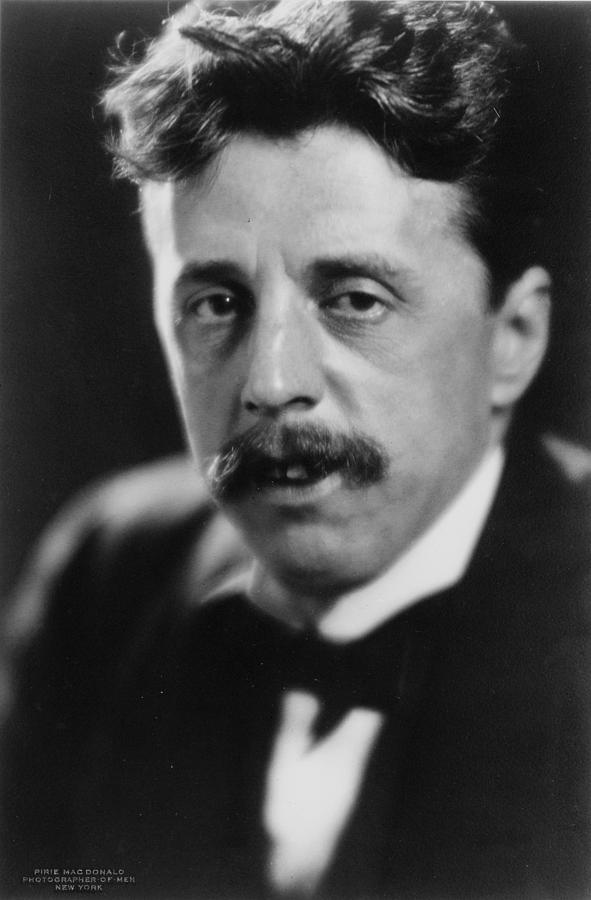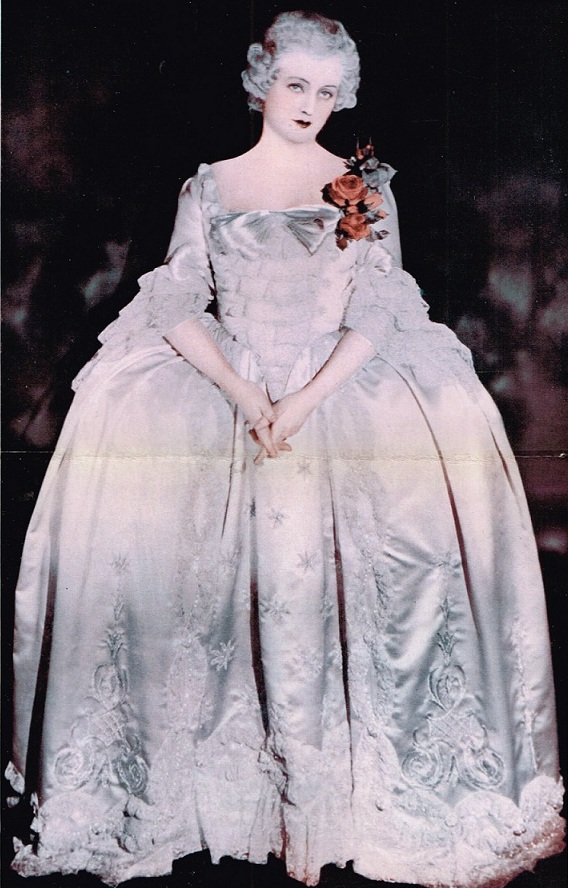Kevin Clarke /Laurence Senelick
Operetta Research Center
1 JUly, 2021
The English author Arnold Bennett (1867-1931) is best known as a novelist and playwright. He also kept a journal in which he discusses various operetta performances he attended over the years, in London, Berlin, Vienna, Paris and elsewhere. Researcher Laurence Senelick drew our attention to these passages in which The Merry Widow and Mikado, No! No! Nanette and Lady, Be Good! are described in a very immediate and personal way. We want to share these passages on Lehár, Gershwin, Charell and others here with you, they are all taken from The Journal of Arnold Bennett, published by Garden City Publishing Co. in 1932/1933.

Caricature of Arnold Bennett in “Vanity Fair” in the section “Men of the Day,” April 1913.
[London] Wednesday, January 20th 1897.
At The Mikado, now nearing the close of its fourth or fifth revival. Half-empty house; band apathetic and playing with eyes anywhere but on the music. Seated near the stage, I could realize what at the theatre one realizes so seldom, that the actors are ordinary human beings acting a part for a livelihood; I could see beneath the mask the evolutions of the real person, his lassitudes, excitements, pleasures, wearinesses. Yet the excellence of The Mikado is such that as the evening passed, the piece took hold of the players, and lifting them out of their monotony, did away with the ennui that disclosed their humanity.
[London] Wednesday, December 15th 1909.
M. [Marguerite Bennett] less than convalescent, but we went to the Opera Society’s Mikado. Chiefly noted the impossibility of getting anything really striking out of such material. But the organization and ensemble were admirable…

Arnold Bennett’s signature, from 1915. (Photo: Wiki Commons)
[London] Wednesday, February 23rd 1910.
M. and I went to see The Merry Widow. I felt I had to see it, in order to be calé on such things when it came to writing about London.

Lily Elsie and Joseph Coyne in ‘The Merry Widow’, London 1907. Elsie and Coyne are playing the parts of ‘Sonia’ and ‘Prince Danilo’ respectively.
Same thing over again. Indeed I could notice no difference. Music even less charming or superficially and temporarily attractive than I had expected. Troupe of about 40. Elaborate costumes, scenery and appointments. Sylvia May, Kate May, and the other principals, all chosen for their looks. Not one could avoid the most elementary false emphasis. Thus Sylvia May looking at a man asleep on the sofa: “But he may wake up” (when there was no question of another man asleep) instead of “He may wake up.” This sort of thing all the time. Also such things as “recognize.” Three chief males much better. All about drinking and whoring and money. All popular operetta airs. Simply nothing else in the play at all, save references to patriotism. Names of tarts on the lips of characters all the time. Dances lascivious, especially one.
I couldn’t stand more than two acts. Too appallingly bored.
[New York] Saturday, November 11th 1911.
Last night. Dinner at Mrs. Edgar Selwyn’s. Then Geo. M. Cohan’s theatre.
The Little Millionaire, written, largely composed, and produced by G.M.C., who takes the principal part and who built the theatre. He has in particular a voice, but he is a good dancer. Man about 35 probably, slim, and looks on stage what he probably is – a mixture of shrewdness and good nature.
Bring his family into show. Both his father and mother have principal parts, and he is ingenious enough to make them marry at the end. The last curtain is he and his father doing a pas de deux.
A N.Y. institution, apparently beloved.
Plot of piece quite clear. In 3 acts. “The Action of Act II will not be interrupted by musical numbers.” The second act is beautifully constructed, and dramatically effective, and full of invention of all kind. No salacity in the piece at all.

Arnold Bennett in the early 1920s. (Photo: Pirie MacDonald / Wiki Commons)
[London] Wednesday, March 19th 1924.
The Gondoliers at Prince’s last night. I thought this was better than it proved to be. There are at least half a dozen magnificent tunes in it, and beyond those – nothing. Immense longeurs in the action, especially towards the end of each act, and the “climaxic” explanation on the other hand is much too hurried. The fun is merely childish. Also it is “healthy” fun. The one joke of the gondolier about taking off his cap or anything else to reason “seemed quite shocking.” It was all too far respectable. The packed audience was also stodgy and ugly. In fact you wondered where the people came from – so dull were they. However, the applause was much less than it used to be. The whole affair dull, save for the magnif. tunes. I don’t want to see any more G & S. Fundamentally the thing is dead.
[Paris], Friday, May 9th 1924.
Last Saturday we went to the Ba-Ta-Clan, Paris, to see La Danse des Libellules, which I had been told was rather good and very gay, and which I had also heard was the most undressed “revue” in Paris. Paid about 9s.6d. for a seat. House full, though theatre a long way off. I soon saw it wasn’t a revue, but a musical comedy. Then things in it seemed to remind me of other things. Then we looked at the programme and saw the name of Franz Lehar. It proved to be a French version of what is called in England The Three Graces, a perfectly terrible piece of inane dullness of which we saw the first night at the Empire some months ago. It was not gay. It was particularly undressed. However, it was perhaps less boring than The Three Graces, no doubt because the resounding acoustics of the old-fashioned renovated salle made some of the hearing difficult. A petit bourgeois audience. A few people in evening dress and one woman fairly striking. A long interval for the journal lumineux and for the loud incessant hawking of constables. The usual terrible hags as ouvreuses and programme sellers. The usual narrow passages. The contrôle, usually so smart with the evening sits, was very shabby. At the end of Act II we got a taxi to the Quai d’Orsay Hôtel, and the taxi and the driver were both apparently in the last stages of poverty.

Caricature of Arnold Bennett at his type writer, around 1913. (Photo: The American Magazine)
[London] Tuesday, March 24th 1925.
No! No! Nanette at the Palace Theatre last night. This is supposed to be the most popular musical comedy of modern time. Edgar Selwyn saw it in Chicago and praised it very highly. It contains three or four extremely catchy jazz tunes. Also Binnie Hale – who is young, has style, charm, and is a very good dancer – for a star. It also contains Joseph Coyne, who is simply admirable, and Geo. Grossmith, who is good. These two together on the stage do admirably funny scenes. It also contains some women who are competent or a bit more. The music “catchy.” It is perhaps the best musical comedy I ever saw.
[Vienna] Wednesday, July 22nd 1925.
Great heat. No waistcoat even in the evening. Went to a performance of Leo Fall’s Madame Pompadour at the Stadttheater last night – the piece was recently a failure in London, I think. Pompadour is a great part, but it is certain that Evelyn Laye couldn’t play it. Last night the part was played by an ageing actress, who would however still “pass.” She had some good notes left, and sang with style. All the spoken parts were rotten. The comedian part was nicely played, with restraint. The chorus was the worst chorus I ever heard. The finale of the 2nd Act made you wonder how the manager had the damned cheek to present such a thing at all Leo Fall seems to me to be the best of these Viennese operetta composers. Certainly much better than Franz Lehar. It seems that all the fashionable operetta composers congregate at Ischl, in the Salzkammergut (and near here) and that such composition is a regular industry there.

Miss Evelyn Lay as Madame Pompadour.
Sunday, July 26th 1925.
…[Rudolf] Kommer suggested that I should re-write the book of Orphée aux Enfers for production by Max Reinhardt in New York. I did not refuse. He told me that the big theatrical people in New York had no interest in or knowledge of theatre as such; but were just speculators and adventurers. Much the same in London…
Monday, July 27th 1925.
…Kommer took us to Orphée aux Enfers at Stadttheater. It began at 7.30. I had never seen this before. The music is delicious. So is the plot. The production was terrible, and I don’t see how it could have been better in the circumstances. I calculated that the stalls, full, held about £20 only. To which Kommer retorted that the actors didn’t get more than 3 million kr. a month (which is about £9 sterling) – at most. I asked: Is it worth while doing things when they have to be done so badly?” He said: “Why, of course…” He then recounted what the theatre meant to him in his native town (Czernowitz, Eastern Austria), when he was a schoolboy. He said it coloured his whole life. They did everything very badly, and he saw everything. He said: “I couldn’t walk to that theatre. I had to run there.”…

Arnold Bennett in 1928. (Photo: Wiki Commons)
[London] Saturday, May 15th 1926.
To Lady, Be Good! musical comedy at the Empire, Fred and Adele Astaire being the stars. These two fill the theatre, even during a general strike. And they deserve to do so. Also they do it on the strength of having performed in London in only one musical comedy previously – and a perfectly silly musical comedy Stop Flirting. Lady, Be Good! Is not anything like as bad as Stop Flirting, nor is it even as bad as the critics and others said it was. It is bad, like all musical comedies, but it is one of the least bad musical comedies I have seen for a very long time. The Astaires did not please me as much as they did in Stop Flirting, but they are very fine.

Gershwins “Lady, Be Good!” with the Astaires on the cover of “The Play.”
[Vienna] Monday, May 30th 1927.
…I dined at an open-air restaurant near the Theater an der Wien. Decent. Then to the said theatre to see Oscar Strauss’s Die Königin, supposed to be the rage of the moment. Vienna is the centre and birthplace of musical comedy. Yet the show was very poor. Music, on its own plane, not so awful, but the rest awful. Two women and one man: three stars are well on in age, and without real talent for either singing, dancing, or acting, and without voices. The whole affair slack, inartistic, dull, and largely ugly to the eye. We stood two acts.
[Berlin] Sunday, September 11th,1927.
Cocktail. Sandwich. Then to the Grossesschauspielhaus to see German spectacular transmogrification of The Mikado by Charell. Then, after 75 minutes of this, to a restaurant to dine.

The finale of the Erik Charell production of “The Mikado” at Großes Schauspielhaus in Berlin. (Photo: Operetta Research Center Archive)
A special thank you to Laurence Senelick for finding these diary passages and for sharing them with us.
